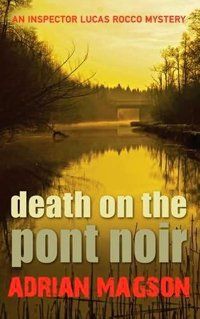 Written by Adrian Magson — December 1963. A few short weeks since Kennedy was shot in Dallas and, in France, De Gaulle is no stranger to assassination attempts either. When the president’s chief bodyguard shows up at the Amiens police headquarters, Inspector Lucas Rocco finds himself lumbered with a hush-hush mission he did not ask for. He would much rather be investigating a strange accident that led to the death of a local tramp.
Written by Adrian Magson — December 1963. A few short weeks since Kennedy was shot in Dallas and, in France, De Gaulle is no stranger to assassination attempts either. When the president’s chief bodyguard shows up at the Amiens police headquarters, Inspector Lucas Rocco finds himself lumbered with a hush-hush mission he did not ask for. He would much rather be investigating a strange accident that led to the death of a local tramp.
At the same time, a disagreement between locals and five Englishmen in a village restaurant near Amiens turns to violence, and Rocco gets the chance to practice his English and question the men. The men claim it was all a misunderstanding and that they are merely visiting local British military cemeteries around the Somme. They offer generous compensation and profuse apologies. But why is a former Le Mans racing driver involved with this rough bunch? And why is a British MP lobbying the French Ministry of Justice to release the men?
Then Rocco learns that one of the Englishmen is a London gangster with links to the notorious Kray twins. With the collusion of his superior officer, Massin, he goes to London to investigate further. He uncovers a shady trail of crime that may end with a plot to assassinate Charles De Gaulle himself.
I am always excited when I discover a new crime series that I want to tackle from start to finish and this is one such series. Death on the Pont Noir is the third novel in the Inspector Lucas Rocco series, set in the Picardie region in the early 1960s. What this rural area in the north of France lacks in glamour, it makes up for in atmosphere – foggy marshlands, forgotten B roads, claustrophobic villages that do not look kindly on foreigners in their midst.
There is a noirish feel to the series, but without the minimalist style that sometimes accompanies the noir novels of the 50s and 60s. Instead, what we find here is unhurried plotting, allowing for plenty of time to develop the narrative and the main characters. Yet there is also enough action to keep any crime fiction reader engaged, combined with a sense of history, political intrigue, but also humorous observations about the differences between the British and French mindsets.
Rocco manages to avoid the clichéed cop image, despite being ex-army and divorced. He has been moved to a rural area from Paris for disciplinary reasons and the author does a great job of conveying the initial sense of bewilderment the city cop experiences among the vagaries of country life. However, alongside Rocco you soon find out that crime here is the same animal it is anywhere else. You will also find the quirky secondary characters gain more and more contours with each book: Claude Lamotte, the local bobby or garde champêtre; his daughter Alix, fresh-faced new recruit to the police force; and Madame Denis, Rocco’s tough-as-old-boots, inquisitive neighbor. The superior officer, Commissaire Massin, also defies any easy labelling. He is an intriguing mix of supportiveness and cowardice.
The first two books in the series tackled topics as diverse as wartime collaborators and Algerian independence. The 60s were a period of profound transformation not just in France, but around the world. If the first book had a little bit of the feel of preparing the scene for a new series, by now the author and the reader have settled into the landscape, characters and period, and the series is getting better and better. Magson’s style in these novels has been compared to Simenon, and there certainly is that same dexterity in portraying the claustrophobia of the small village, the same fine psychological details, but Rocco is far more of an action man than Maigret. My one quibble with this particular book, which does not hold true for the others in the series, was that I did guess quite early on who the real culprit was.
This is a series that deserves wider recognition and I, for one, hope it will run and run. Read our recent interview with Adrian Magson here.
Allison & Busby
Print/Kindle/iBook
£4.79
CFL Rating: 4 Stars









Loved your review, MarinaSofia. You hooked me with these words: ” What this rural area in the north of France lacks in glamour, it makes up for in atmosphere – foggy marshlands, forgotten B roads, claustrophobic villages that do not look kindly on foreigners in their midst. . . Instead, what we find here is unhurried plotting, allowing for plenty of time to develop the narrative and the main characters.”
I don’t rush to buy crime fiction, but a well written one with a lovely setting? I’ll certainly give it a try.